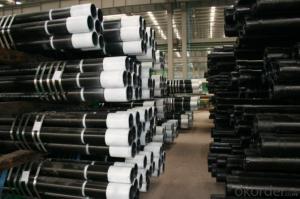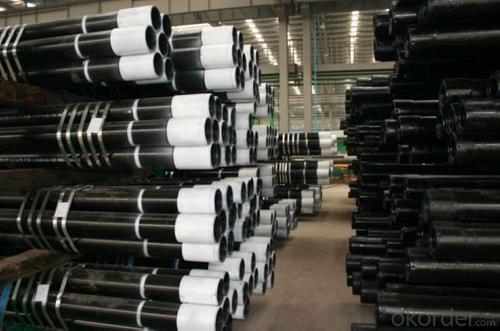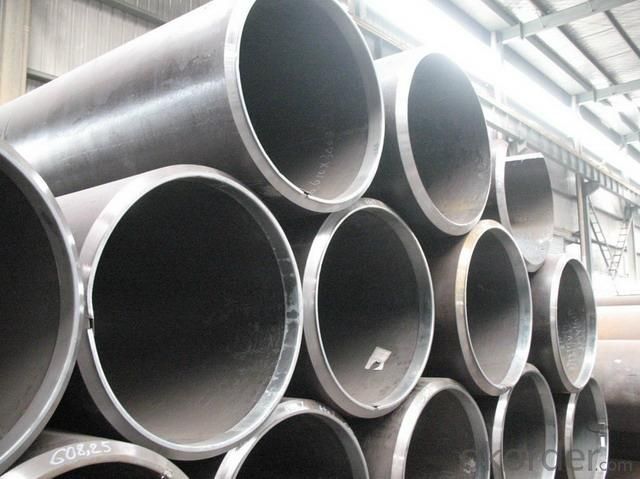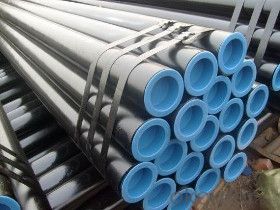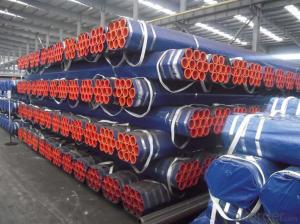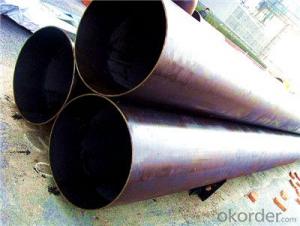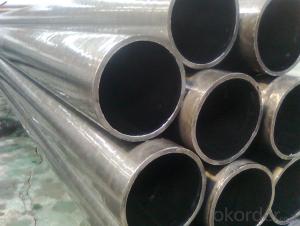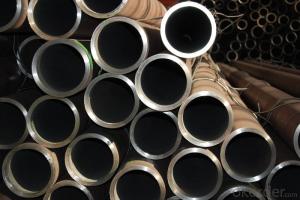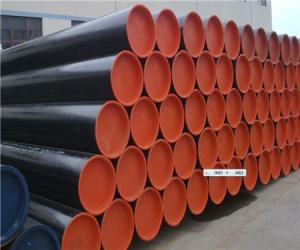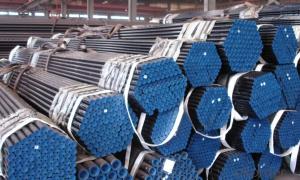Seamless Steel Pipe With SCH40/80/STD Factory Price And High Quality
- Loading Port:
- Tianjin
- Payment Terms:
- TT OR LC
- Min Order Qty:
- 33 m.t.
- Supply Capability:
- 400 m.t./month
OKorder Service Pledge
OKorder Financial Service
You Might Also Like
Product Description:
Alloy Seamless Steel Pipe
1)OD:8-450mm
2)Thickness:1-60mm
3)MOQ: 25 tons
4)Material:A213 A335 A199, etc.
Alloy Seamless Steel Usage
Applicable to the general structure, mechanical structure with seamless steel tubes
Quality Standard
ASTM A519 Seamless Carbon and Alloy Steel Mechanical Tubing
JIS G3441 Alloy steel tubes for machine purposes
DIN 2391 Seamless Precision Steel Tubes
EN10305 Steel tubes for precision applications Technical delivery conditions Seamless cold drawn tubes
EN 10297 Seamless circular steel tubes for mechanical and general engineering purposes
Alloy Seamless Steel Pipe Grade
ASTM A519 1010-1045, 4130-4142, 5135
JIS G3441 SCM 415 TK, SCM 418 TK, SCM 420 TK, SCM 430 TK, SCM 435 TK, SCM 440 TK
JIS G3444 STKM 11A, STKM 12, STKM 13, STKM 14, STKM 15, STKM 16, STKM 17, STKM 18
STKM 19, STKM 20
BS 6323 CFS 3, CFS 3Aa, CFS 4, CFS 5b, CFS 6, CFS 7, CFS 8d, CFS 9, CFS 10, CFS 11
Alloy Seamless Steel Pipe Size
Outer Diameter Hot finish 2" - 30", Cold drawn 0.875" - 18"
Wall Thickness Hot finish 0.250" – 4.00", Cold drawn 0.035" – 0.875"
Length Random Length, Fixed Length, SRL, DRL
Alloy Seamless Steel Pipe Heat treatment
Annealed, Full Annealed, Bright annealed, , Spheroidize annealed
Normalized, Stress relieved, Cold finished, Quenched and Tempered
Alloy Seamless Steel Pipe Packing
Plastic plugs in both ends, Hexagonal bundles of max 2,000kg with several steel strips, Two tags on each bundle, Wrapped in waterproof paper, PVC sleeve, and sackcloth with several steel strips
Alloy Seamless Steel Pipe Test
Chemical Component Analysis, Mechanical Properties (Ultimate tensile strength, Yield
strength, Elongation), Technical Properties (Flattening Test, Flaring Test, Bending Test, Hardness Test, Blow Test, Impact Test etc), Exterior Size Inspection Mill Test Certificate EN 10204/31B
PICTURE
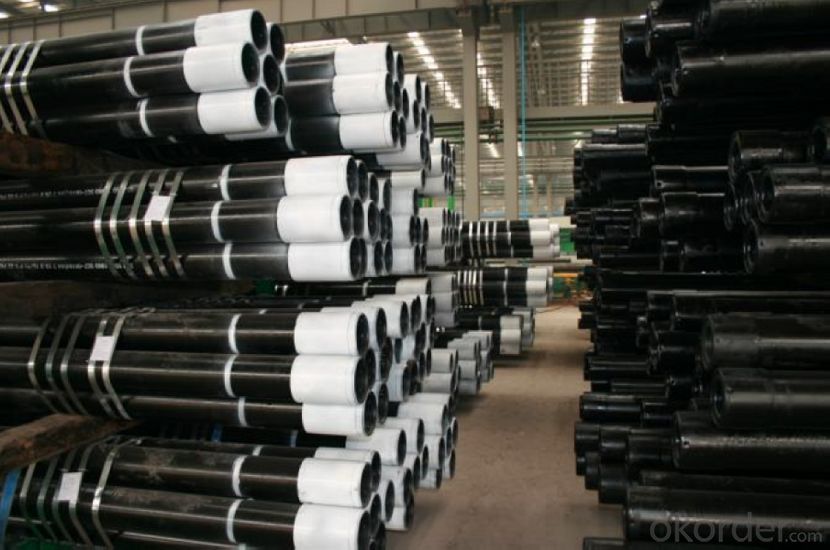
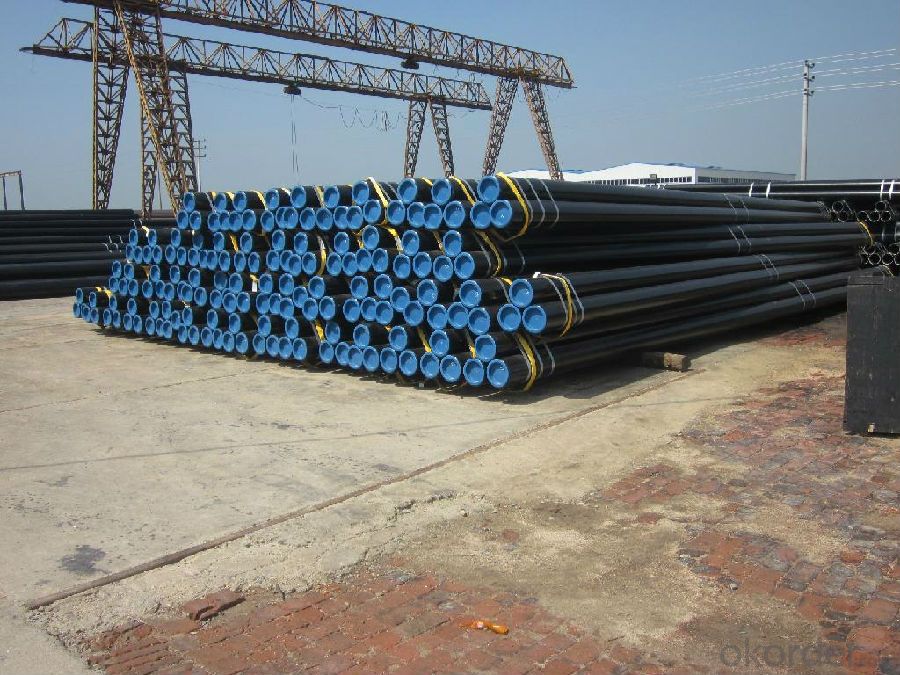
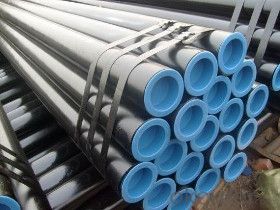
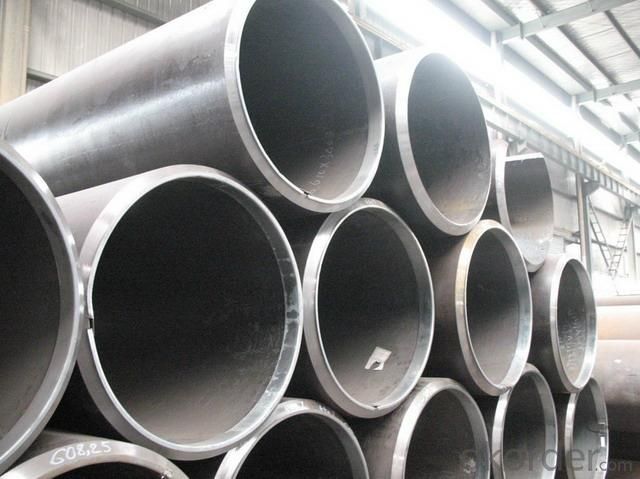
- Q: What is the maximum length of steel pipes available in the market?
- The market offers steel pipes in varying maximum lengths, which are influenced by factors like steel type, manufacturing capacity, transportation restrictions, and customer demands. Generally, steel pipes can be produced up to 12 meters (40 feet) or even longer. However, it is crucial to consider that handling and transporting longer lengths might pose challenges, necessitating specialized equipment or techniques. Ultimately, the industry and customers' specific requirements and capabilities determine the maximum length of steel pipes available in the market.
- Q: What are the safety considerations when working with steel pipes?
- When working with steel pipes, there are several important safety considerations to keep in mind. Firstly, it is crucial to wear appropriate personal protective equipment (PPE). This includes safety glasses or goggles to protect the eyes from flying debris or sparks, gloves to protect the hands from sharp edges or hot surfaces, and steel-toed boots to protect the feet from falling objects or heavy equipment. Additionally, wearing a hard hat is recommended to protect the head from potential falling objects or overhead hazards. Next, it is important to be aware of the weight and size of steel pipes. Handling heavy pipes can put strain on the back and muscles, so it is essential to use proper lifting techniques and seek assistance when necessary. Using lifting equipment, such as cranes or forklifts, can also help prevent injuries related to heavy lifting. Another safety consideration is the risk of cuts or punctures. Steel pipes can have sharp edges or burrs, so it is important to handle them with care and wear appropriate gloves to reduce the risk of injury. Inspecting pipes for any defects or sharp edges before working with them is also recommended. Furthermore, working with steel pipes may involve welding or cutting, which can produce sparks, heat, and fumes. It is crucial to work in a well-ventilated area or use proper ventilation equipment to ensure the removal of harmful gases or fumes. Fire safety precautions should also be taken, such as having fire extinguishers nearby and following proper procedures for hot work. Lastly, it is important to be aware of potential hazards associated with working at heights or in confined spaces. When working on elevated platforms or scaffolding, fall protection measures, such as safety harnesses or guardrails, should be in place. In confined spaces, proper ventilation and monitoring for hazardous gases are essential to prevent asphyxiation or exposure to toxic substances. Overall, by following these safety considerations and adhering to proper procedures, the risk of accidents or injuries when working with steel pipes can be significantly reduced.
- Q: Can steel pipes be used for automotive applications?
- Yes, steel pipes can be used for automotive applications. Steel pipes are commonly used for various automotive components such as exhaust systems, fuel lines, and structural frames due to their high strength, durability, and resistance to corrosion. They provide reliable performance and are cost-effective in automotive manufacturing.
- Q: What is the role of steel pipes in the transportation of liquefied natural gas (LNG)?
- Steel pipes play a crucial role in the transportation of liquefied natural gas (LNG) as they are used to create the necessary infrastructure for the safe and efficient transfer of LNG. These pipes are designed to withstand the extreme cold temperatures and high pressures associated with LNG, ensuring the integrity and reliability of the transportation system. They are used to construct LNG terminals, storage tanks, and pipelines, providing a secure conduit for the LNG to be transported from production sites to distribution centers or export facilities. Steel pipes are preferred due to their strength, durability, and ability to resist corrosion, making them essential for the smooth and reliable transport of LNG across long distances.
- Q: Can steel pipes be used for firefighting systems?
- Yes, steel pipes can be used for firefighting systems. Steel pipes are commonly used for their durability, strength, and resistance to high pressure and heat. They can effectively transport water or other fire suppressants to extinguish fires efficiently, making them a reliable choice for firefighting systems.
- Q: Can steel pipes be used for wastewater treatment facilities?
- Yes, steel pipes can be used for wastewater treatment facilities. Steel pipes are commonly used in wastewater treatment plants due to their durability, resistance to corrosion, and ability to withstand high pressures and temperatures. They are suitable for transporting various types of wastewater, including industrial effluents and sewage, making them an ideal choice for such facilities.
- Q: Can steel pipes be used for underground air supply systems?
- Indeed, underground air supply systems can make use of steel pipes. Due to their robustness, endurance, and ability to withstand external forces like corrosion and impact, steel pipes are frequently employed in underground settings. They possess the capacity to endure the pressure and temperature prerequisites of air supply systems while also being effortlessly installed below ground. Moreover, steel pipes boast an extended lifespan, rendering them a financially prudent option for underground air supply systems. Nonetheless, when selecting the suitable steel pipes for a particular underground air supply system, it is crucial to take into account factors such as soil conditions, potential for corrosion, and local regulations.
- Q: How are steel pipes cleaned and flushed?
- Depending on specific requirements and conditions, different methods can be used to clean and flush steel pipes. One way to achieve this is through mechanical cleaning, which involves physically removing debris, rust, or scale from the inner surface of the pipes using wire brushes, scrapers, or other abrasive tools. This method is effective in removing loose or easily detachable contaminants. Chemical cleaning is another commonly used method, especially for pipes with stubborn deposits or rust. Various chemicals or cleaning agents are flushed through the pipes to dissolve or loosen the buildup, which can then be washed away. Acid-based solutions are often used for this purpose, but it's crucial to select the appropriate chemical and concentration to prevent pipe damage. High-pressure water jetting is an effective technique for cleaning and flushing steel pipes. Water is pumped at high pressure through a nozzle, generating a powerful jet that dislodges and removes debris or deposits from the pipe walls. This method is particularly useful for eliminating hard or compacted materials that are difficult to remove by other means. In some cases, a combination of these methods may be necessary to achieve the desired cleanliness. For example, mechanical tools can be used for pre-cleaning, followed by chemical cleaning or high-pressure water jetting to ensure thorough flushing and contaminant removal. Regular maintenance and cleaning of steel pipes are crucial to maintain efficiency and prevent corrosion. It's important to adhere to proper procedures and safety guidelines when cleaning and flushing steel pipes to achieve effective results and prevent any damage to the pipes.
- Q: What are the safety precautions to follow when working with steel pipes?
- When working with steel pipes, it is important to follow several safety precautions to ensure the well-being of yourself and those around you. These precautions include: 1. Personal Protective Equipment (PPE): Always wear the appropriate PPE when working with steel pipes. This includes safety glasses, gloves, steel-toed boots, and a hard hat. PPE helps protect you from potential hazards such as flying debris, falling objects, and sharp edges. 2. Proper Lifting Techniques: Steel pipes can be heavy and awkward to handle. Always use proper lifting techniques to avoid strain or injury. Bend your knees, keep your back straight, and use your legs to lift the pipes. If a pipe is too heavy to lift on your own, ask for assistance or use mechanical lifting equipment. 3. Secure Working Area: Ensure that the work area is clean, organized, and free from tripping hazards. Keep the floor clear of tools, debris, and other obstructions that may cause accidents. Additionally, barricade or cordon off the work area to prevent unauthorized access and ensure the safety of others. 4. Use Proper Tools and Equipment: Use the right tools and equipment for the job. This includes using wrenches, pipe cutters, and clamps designed specifically for steel pipes. Using improper tools can lead to accidents, damage to the pipes, or faulty connections. 5. Proper Storage: Store steel pipes in a secure and organized manner to prevent them from falling or rolling onto someone. Stack the pipes in a stable position, and use racks or supports to ensure they are not at risk of toppling over. 6. Secure Connections: When joining steel pipes, ensure that the connections are properly secured. This includes using appropriate fittings, tight fasteners, and following the recommended torque specifications. Loose or improperly secured connections can result in leaks, bursts, or other failures. 7. Proper Ventilation: If working in an enclosed space, ensure adequate ventilation to prevent the buildup of harmful gases or fumes. Welding or cutting steel pipes can release hazardous gases, so make sure the area is properly ventilated or use respiratory protection if necessary. 8. Fire Safety: Steel pipes can become extremely hot during welding or cutting processes. Have fire extinguishers readily available and know how to use them. Clear any flammable materials from the work area and be cautious of sparks or open flames. 9. Regular Inspections: Regularly inspect steel pipes for signs of damage, such as cracks, rust, or degradation. Replace any damaged or compromised pipes to avoid potential failures or accidents. By following these safety precautions, you can minimize the risks associated with working with steel pipes and ensure a safe working environment. Remember, safety should always be the top priority.
- Q: Can steel pipes be used for oil refineries?
- Yes, steel pipes can be used for oil refineries. Steel pipes are commonly used in oil refineries due to their durability, high strength, and resistance to corrosion, making them suitable for transporting crude oil and refined products under high pressure and harsh conditions.
Send your message to us
Seamless Steel Pipe With SCH40/80/STD Factory Price And High Quality
- Loading Port:
- Tianjin
- Payment Terms:
- TT OR LC
- Min Order Qty:
- 33 m.t.
- Supply Capability:
- 400 m.t./month
OKorder Service Pledge
OKorder Financial Service
Similar products
Hot products
Hot Searches
Related keywords
